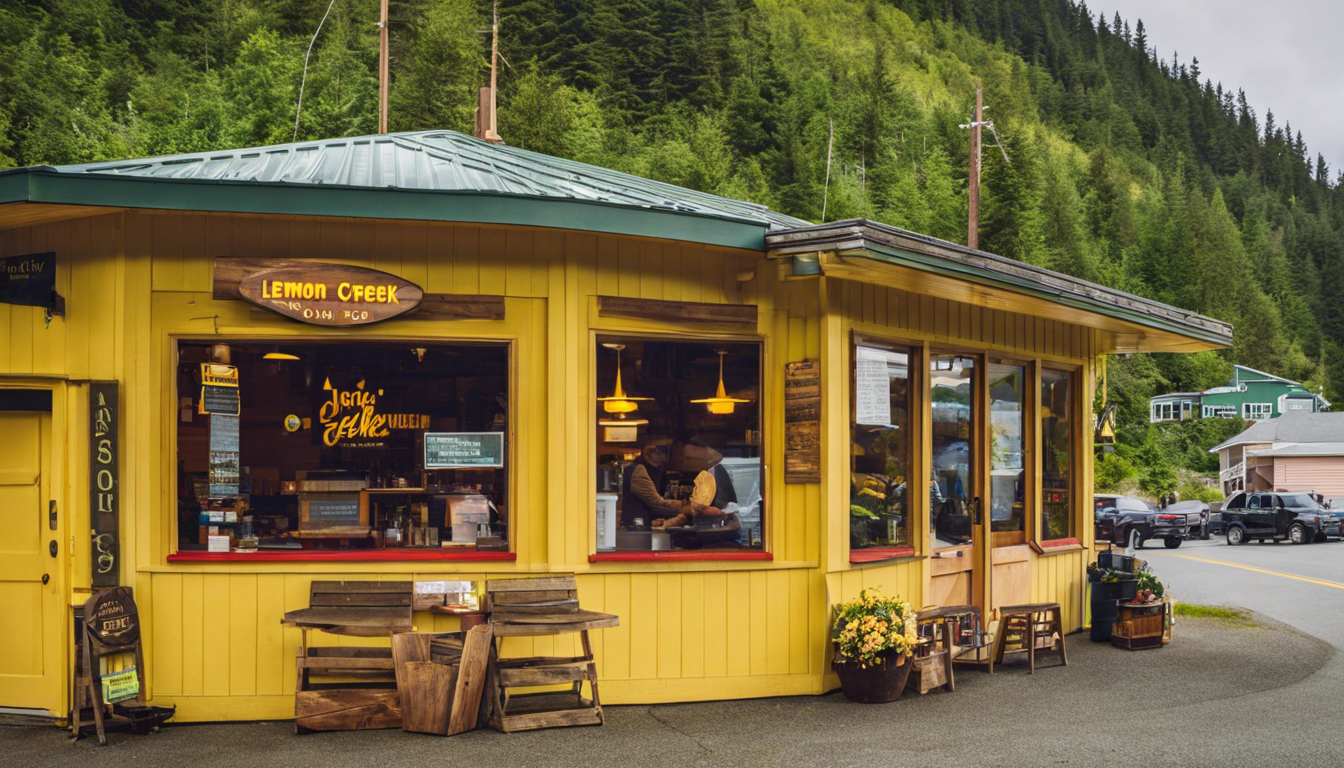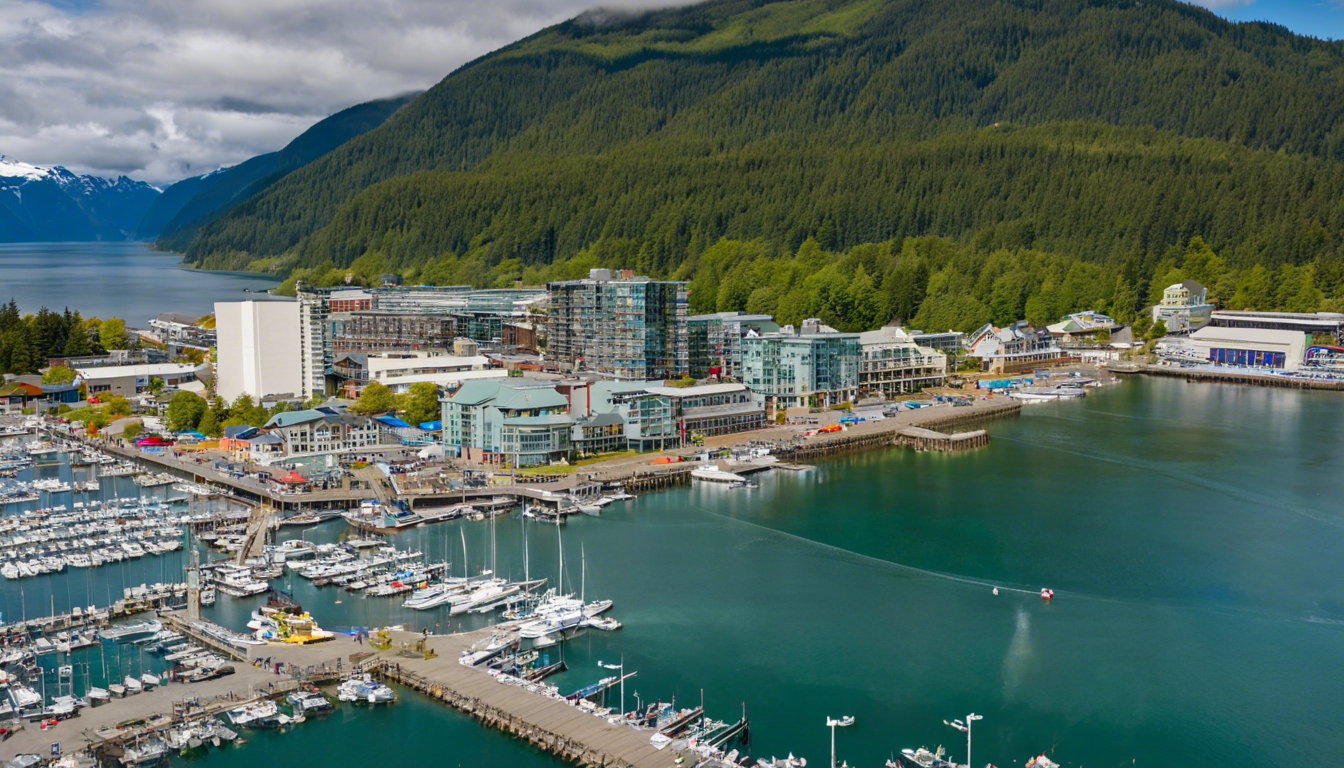1. Mendenhall Valley: Suburban Bliss
Nestled amidst the stunning natural beauty of Juneau, Alaska, Mendenhall Valley stands out as a haven for families seeking a blend of suburban comfort and outdoor adventure. This spacious neighborhood offers a more traditional living environment with its array of houses and generous yards, making it a perfect setting for those with children or anyone craving a slice of serene suburban life.
The journey to making Mendenhall Valley your home is unique, given Juneau's distinctive geographic location. For those considering the move, transportation options are a key consideration. The Alaska Marine Highway System or flying are your primary gateways to this picturesque town. If you're bringing belongings, consider using the ferry or shipping services out of Seattle, or perhaps selling heavier items to repurchase locally, thanks to amenities like a large Costco.
Once settled, residents of Mendenhall Valley are greeted with a lifestyle characterized by its stunning vistas and a tight-knit community vibe. Despite the challenges of living costs, especially in housing and dining, the area compensates with abundant outdoor activities. From hiking and fishing to enjoying the local glaciers and wildlife, the valley does not disappoint the adventure enthusiast. Be prepared for the weather, though. High precipitation levels and shorter daylight hours in winter are part of the package.
Mendenhall Valley, located in Juneau, Alaska, has seen a population growth of 8% since 2000, boasting a population density of 2,395.50 people per mile, with an average household size of 3 people. Approximately 47% of households have children, highlighting the family-friendly nature of the neighborhood. The annual residential turnover is 19%, with 26% of residents having lived in their homes for over 5 years, indicating a stable community. The median year in residency is 2.69 years, showcasing a mix of long-standing and newer residents. The total population is 10,387, spread across 3,800 households, with a median age of 35.23 years, making it a vibrant community of both young families and established professionals. Source
As for community life, Mendenhall Valley scores high on scenery, thanks to its breathtaking views, and the local school system is well-funded and safe, making it an ideal setting for raising a family. The median income in Mendenhall Valley is reported to be $79,371, reflecting the area's relative prosperity. Source
In summary, Mendenhall Valley offers a picturesque setting for those looking to balance suburban living with the great outdoors. Its spaciousness, combined with the natural beauty and community spirit of Juneau, makes it a neighborhood worth considering for anyone looking to call Alaska home.
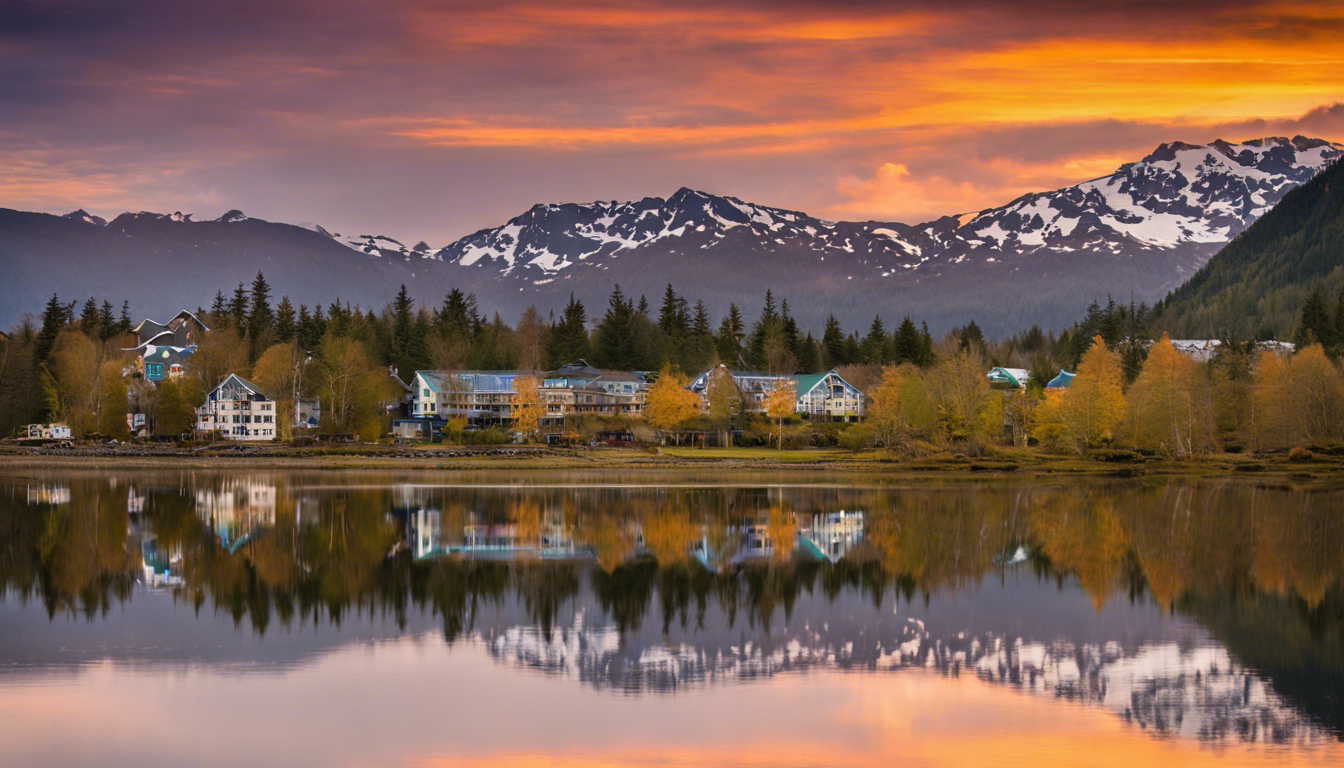
2. Downtown Juneau: Urban Vibrancy
Downtown Juneau, a heart of urban vibrancy set against the backdrop of Alaska's wild beauty, offers a lifestyle unmatched for those seeking the perfect blend of nature and city living. Here, residents enjoy the breathtaking scenery that Alaska is famed for, alongside a lively community spirit and a host of cultural activities. From the arts to music, and a rich outdoor lifestyle including hiking and skiing, downtown Juneau is a hub of activity year-round.
The employment opportunities in downtown Juneau are diverse, reflecting the community's well-educated and well-traveled populace. However, the area has felt the impact of economic fluctuations, notably in state jobs and the tourism sector, which are significant employment sources. This economic dynamic, coupled with the high cost of living, including expensive housing and dining options, presents challenges and considerations for those contemplating a move to Juneau.
Transportation within downtown Juneau scores a C-, with a car being almost a necessity unless you live within walking distance of your workplace and a grocery store. The public transport system, rated C, can be navigated but requires planning due to a limited schedule. For those moving to Juneau, the journey involves careful consideration of transport options for both personal travel and the logistics of relocating belongings, with the Alaska Marine Highway and air travel being primary routes.
Despite these challenges, downtown Juneau's school system is a beacon of excellence, providing a safe and well-funded education environment, crucial for families and those planning for the future. The community's approach to education and the minimal impact of COVID-19 on schooling options reflect the resilience and strength of Juneau's societal fabric.
Recreation in downtown Juneau varies dramatically with the seasons, from a vibrant summer filled with tourist activity and outdoor adventures to a quieter, introspective winter that offers its own stark beauty and community events celebrating the return of light. The contrast between "Winter Juneau" and "Summer Juneau" shapes the unique lifestyle experiences available to residents.
Living in downtown Juneau is a study in contrasts: the challenge of high living costs and the joy of community; the beauty of the natural environment against the backdrop of economic uncertainty; and the vibrant summer versus the quiet, contemplative winter. It's a place where the spirit of the community and the allure of the landscape beckon to those seeking a life less ordinary.
Downtown Juneau Statistics in Detail
Downtown Juneau, enriched with a blend of natural beauty and urban sophistication, stands as a distinctive community within Juneau, Alaska. Here are some key statistics that paint a picture of this vibrant neighborhood:
-
Population and Demographics: As of July 1, 2022, Downtown Juneau has a population of 31,685, reflecting a slight decrease of 1.8% from April 1, 2020. The area is diverse, with 64.0% White, 9.4% American Indian and Alaska Native, 7.2% Asian, and 7.2% Hispanic or Latino. The median age is a mature 46.90 years, indicating a well-established community. Source
-
Housing and Living Conditions: The median value of owner-occupied housing units stands at $404,600, with a median gross rent of $1,464, reflecting the high cost of living in this picturesque location. Despite this, the community boasts a 64.3% owner-occupied housing unit rate, showcasing a strong sense of permanence and investment among its residents. Source
-
Education and Employment: Downtown Juneau is home to a well-educated population, with 95.4% of persons age 25 years and over being high school graduates or higher, and 40.7% holding a bachelor's degree or higher. The median household income is an impressive $95,711, reflecting the prosperous nature of the community. Source
-
Climate and Geography: Nestled at Latitude 58°18'15" N and Longitude 134°24'30" W, Downtown Juneau experiences a Subarctic-Maritime climate, with mild winters and moist conditions year-round. The area averages 62.27 inches of precipitation annually, with 222 rainy days. Source
-
Community and Lifestyle: Downtown Juneau offers a unique lifestyle, balancing urban amenities with access to unparalleled natural beauty. The community is active, with a high rate of households possessing a computer (96.4%) and broadband Internet (92.0%), indicating a connected and engaged population. Source
In summary, Downtown Juneau represents a harmonious blend of urban living and natural wonder, with a robust community spirit, diverse population, and high living standards.
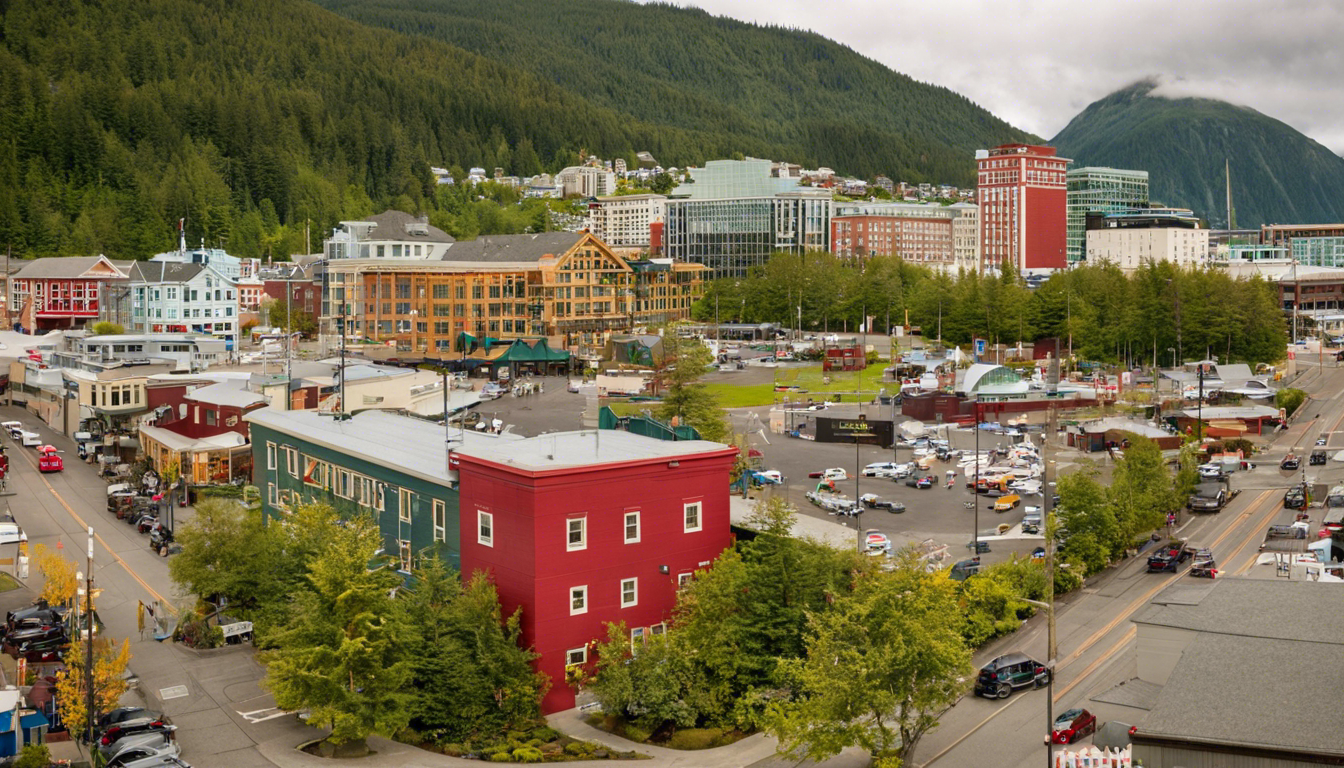
3. Douglas: Island Serenity
Douglas, a serene island community in Juneau, Alaska, offers residents a unique blend of breathtaking scenery and a small-town feel, making it an ideal location for those seeking tranquility within nature's embrace. This neighborhood is characterized by its stunning views, especially on sunny days, where the natural beauty of Alaska unfolds in a panoramic display of awe.
For those considering Douglas as their next home, it's essential to understand the employment opportunities that await. Post-COVID, the area has seen a resurgence in hiring, with many sectors offering reasonable pay, earning it a B+ rating in employment situation. However, the walkability of Douglas is rated C-, indicating the necessity of a car for most residents unless living close to work and essential amenities like a grocery store. Public transportation scores a C, with limited bus routes further emphasizing the importance of personal transportation in this area. Although Uber, Lyft, and taxis are available, they come with a high price tag.
The housing market in Douglas presents a challenge, rated D-, with a struggle to find reasonably priced accommodations. A modest 420 sq ft apartment costs around $1025/month excluding utilities, while a 2 bed 1 bath condo is priced around $170k plus HOA fees. Those looking for a 3 bedroom home with amenities should be prepared for prices starting at $500k plus high property taxes, highlighting the area's high cost of living which is rated D. Despite these challenges, the school system in Douglas is top-notch, receiving an A rating for its well-funded and safe educational institutions, minimal impact from COVID on distance learning, and a variety of extracurricular activities available to students.
Recreation in Douglas varies seasonally, with a B+ rating in summer thanks to the abundance of outdoor activities, and a D- in winter, reflecting the limited options during the colder months. Despite this, the community's small-town vibe fosters a sense of mutual assistance and familiarity among residents. The unique aspects of living in Alaska, such as extreme daylight variations and a strong connection to nature, are ever-present in Douglas, offering a lifestyle deeply connected to the environment despite its challenges.
Crime levels in Douglas are moderate, with most incidents being non-violent drug offenses. The Juneau Police Department is considered to do an above-average job in maintaining safety, contributing to the community's overall sense of well-being. Despite the high costs of living, including gas prices and weekly grocery bills, residents often express a sense of blessing to live in such a unique and beautiful environment.
Douglas has a rich history and a vibrant community life. Originally part of the Auke and Taku peoples' territory, Douglas transformed significantly following the discovery of gold in 1880. The towns of Treadwell and Douglas emerged, marking the start of rapid development. Despite the dissolution of its incorporation in 1970 when Douglas and Juneau unified, the spirit of the community remains strong. Today, Douglas boasts a population of approximately 3,000 residents, showcasing growth from a mere 402 in 1890 to 1,243 by 1970, before it was absorbed into Juneau. Its only traditional school, Gastineau Elementary, serves the educational needs of the community alongside the highly ranked Juneau-Douglas High School, which is 11th within Alaska and boasts a graduation rate of 93%. The school's basketball team, the Crimson Bears, had an impressive season in 2023 with 19 wins, underscoring the community's commitment to extracurricular excellence. Source
In summary, Douglas offers a peaceful retreat for those looking to immerse themselves in nature's beauty while navigating the practicalities of island living. Its stunning scenery, combined with a tight-knit community and the challenges of high living costs and limited transportation options, make Douglas a unique choice for those considering making Juneau their home.
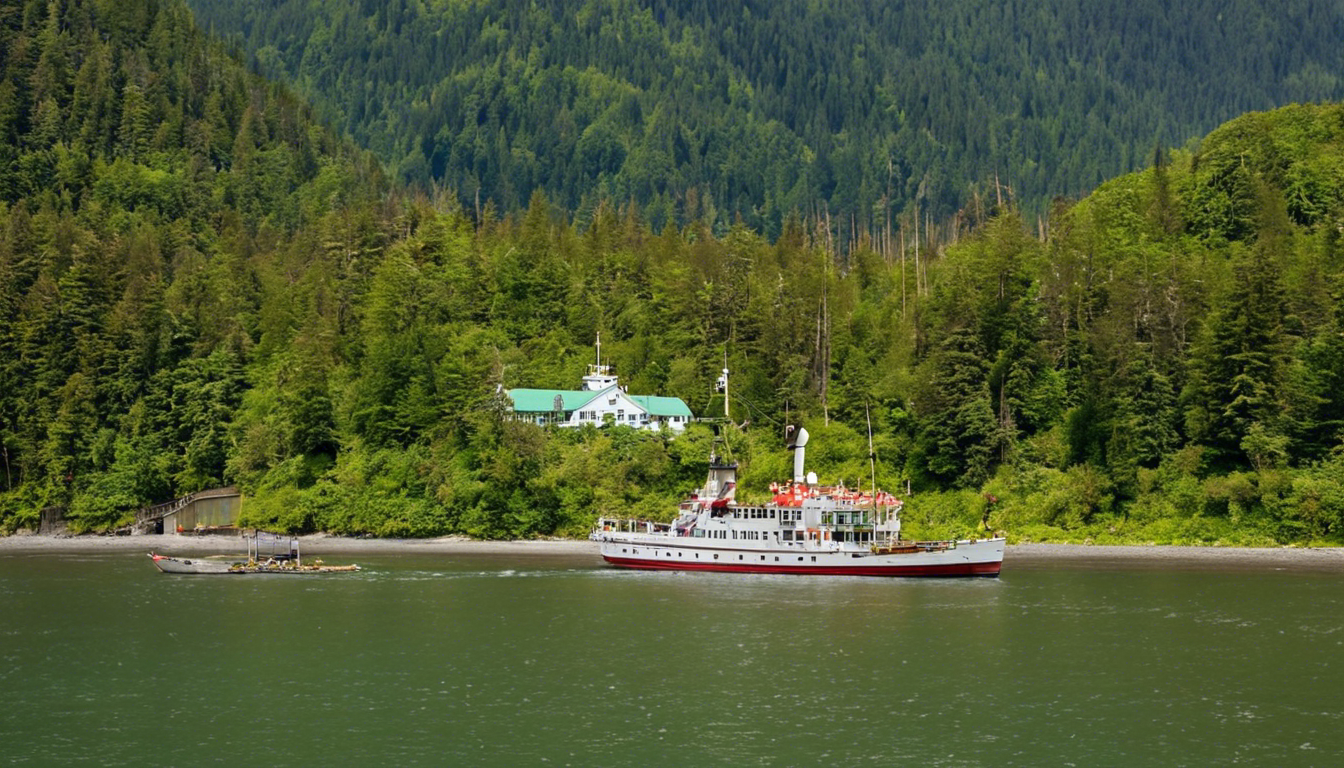
4. Auke Bay: Waterside Living
Auke Bay, a picturesque enclave within Juneau, Alaska, offers an unparalleled living experience for those who dream of life by the water. Here, the scenery is unmatched, with views that earn a solid A+ on any given sunny day. The shimmering bay, framed by distant mountains, provides a backdrop to daily life that few places can rival.
For job seekers, Auke Bay presents promising opportunities, with employment rates rated B+ post-COVID. The community has seen a resurgence of hiring across various sectors, offering reasonable pay scales that make the area an attractive option for professionals and families alike.
However, it's important to note that Auke Bay scores a C- in walkability. Residents here often find that having a car is essential for comfortable living, as home and work locations are typically not within walking distance. Public transportation, rated at a C, is available but relies on a limited bus schedule, making personal vehicles the more convenient choice. For those without a car, be prepared for notably expensive fares when opting for Uber, Lyft, or taxis.
The home market in Auke Bay is challenging, with a rating of D-. Finding reasonably priced housing is a significant struggle for many. A small 420 Sq Ft apartment can set you back $1025/month excluding utilities, while a 2 bed 1 bath condo hovers around the $170k mark plus HOA fees. Those in search of a decent 3 bedroom home should be prepared to start their search at the $500k threshold, plus high property taxes.
On a brighter note, the school system in Auke Bay is rated A, boasting well-funded and safe schools. The minimal impact from COVID on distance learning, along with a variety of extracurricular activities and sports, makes it an ideal place for family life. The University of Alaska Southeast adds to the educational landscape, providing quality college education opportunities.
The cost of living in Auke Bay, however, is rated D, being higher than average in nearly every area. Residents can expect to pay around $5.05/gallon for gas and $5.60/gallon for diesel. Groceries can cost $200-$300 a week, with online orders incurring high shipping costs and delays. Utility costs also trend higher, particularly for homes heated with oil.
Crime levels in Auke Bay are moderate, mostly involving non-violent drug offenses. The area faces a notable drug addiction problem, particularly with opioids and heroin, which is a concern for the community.
Recreational activities in Auke Bay vary by season. Summer months score a B+, offering abundant opportunities for outdoor adventures from fishing to kayaking in the bay. However, winter sees a dip in recreational scores to D-, highlighting the variation in activities available throughout the year.
Despite the challenges related to cost of living and housing, the sense of community and the unique lifestyle afforded by residing in Auke Bay are highly valued. The natural beauty, vibrant community life, and the tranquility of waterside living make Auke Bay a distinctive choice for those considering a move to Juneau, Alaska.
Adding to the detailed view of Auke Bay's living conditions, recent statistics highlight its growing community and demographic landscape. Auke Bay has experienced a population growth of 38% since 2000, boasting a current population of 1,009 individuals living in 422 households. The median age of residents is 43.70 years, reflecting a mature yet dynamic community. With a population density of 318.50 people per mile and an average household size of 2 people, Auke Bay offers a close-knit environment. About 27% of households have children, indicating a family-friendly area. The community shows signs of stability with a 16% annual residential turnover and 31% of residents having lived in their homes for over 5 years. The median year in residency is 2.81, suggesting a mix of long-term and newer residents. The median income in Auke Bay is a robust $98,454, underlining the area's prosperity. Source
Auke Bay's unique character is further emphasized by its geographical and cultural richness. Named after the native Auke people, part of the Tlingit tribe, Auke Bay's heritage and natural beauty, including views of the Mendenhall Glacier and Mount McGinnis, make it a place of historical and visual significance. The area is a renowned hub for whale watching, especially observing humpbacks' "bubble-net feeding." With the Coast Guard cutter Reef Shark based here for patrols, Auke Bay ensures a safe and vibrant community for its residents. Source More Info
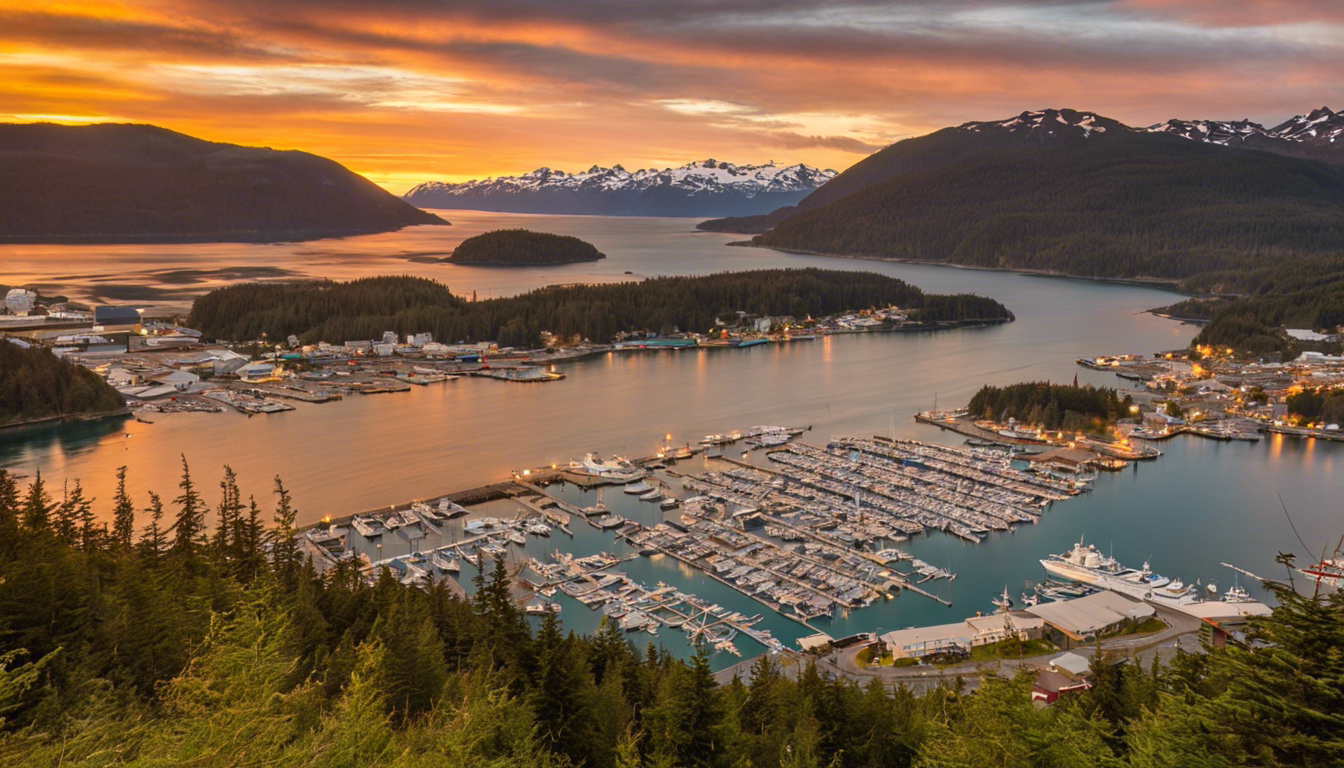
5. Lemon Creek: Convenience at Every Corner
Lemon Creek, a neighborhood that might not catch your eye at first glance, but offers an abundance of convenience and a unique living experience in Juneau, Alaska. This area is characterized by its accessibility to a variety of amenities, making it a practical choice for those who value ease and efficiency in their daily lives.
At the heart of Lemon Creek's appeal is its strategic location. Nestled between residential zones and industrial areas, residents have the unique advantage of being close to both work and leisure. The neighborhood is also home to some of Juneau's key shopping destinations, including large retailers and specialty stores, ensuring that everything you need is just a stone's throw away.
Living in Lemon Creek means embracing the full spectrum of what Juneau has to offer - from the convenience of urban living to the complexities of societal issues. It's a neighborhood where everyday practicality meets the broader questions of life in Alaska. Whether you're running errands at the nearby stores or reflecting on the deeper aspects of community and rehabilitation, Lemon Creek offers a distinctive living experience that's hard to find elsewhere.
Lemon Creek, located in Juneau, Alaska, has a median real estate price of $416,181, making it more expensive than 71.5% of neighborhoods in Alaska and 58.7% in the U.S. The average rental price is $1,989, which is lower than 42.8% of Alaska neighborhoods. It is a rural area based on population density and is situated along the coast. The real estate primarily consists of medium-sized to small mobile homes and single-family houses, with many homes built between 1970 and 1999 or from 2000 to the present. The vacancy rate for homes and apartments is 7.8% (source).
Notable characteristics include its nautical setting, with more than 95.3% of neighborhoods in the U.S. having fewer mobile homes. A significant proportion of government workers reside here, more than 99.2% of neighborhoods in America. The neighborhood boasts one of the shortest average commute times in the country, with 68.1% of residents commuting less than fifteen minutes to work.
Demographically, 5.1% of residents are in a correction facility. The neighborhood has a significant Native American population, comprising 18.0% of residents, and 1.7% of Iranian ancestry. Additionally, 2.9% of residents primarily speak Native American languages at home, which is higher than 99.4% of neighborhoods in America.
Economically, Lemon Creek is an upper-middle-income neighborhood, with a higher income than 60.4% of neighborhoods in the U.S. Around 16.3% of children live below the federal poverty line. The working population is predominantly employed in executive, management, and professional occupations (34.4%), with significant employment in manufacturing, laborer occupations (26.1%), sales and service jobs (22.8%), and government positions (21.8%).
The primary language spoken at home is English (77.9%), followed by Spanish, Tagalog, Native American languages, and Chinese. The neighborhood is diverse, with residents identifying their ethnicity or ancestry as primarily Native American (18.0%), Irish (12.2%), Asian (12.0%), German (8.0%), and Mexican (7.3%). About 17.4% of residents were born in another country.
Most residents (73.4%) drive alone to work, and a notable portion (16.2%) carpool.
In conclusion, Lemon Creek stands out for its convenience and accessibility, balanced with a touch of the unexpected due to its proximity to the Lemon Creek Correctional Center. It's a neighborhood that serves the needs of its residents in more ways than one, making it a compelling choice for those looking to make Juneau their home.
